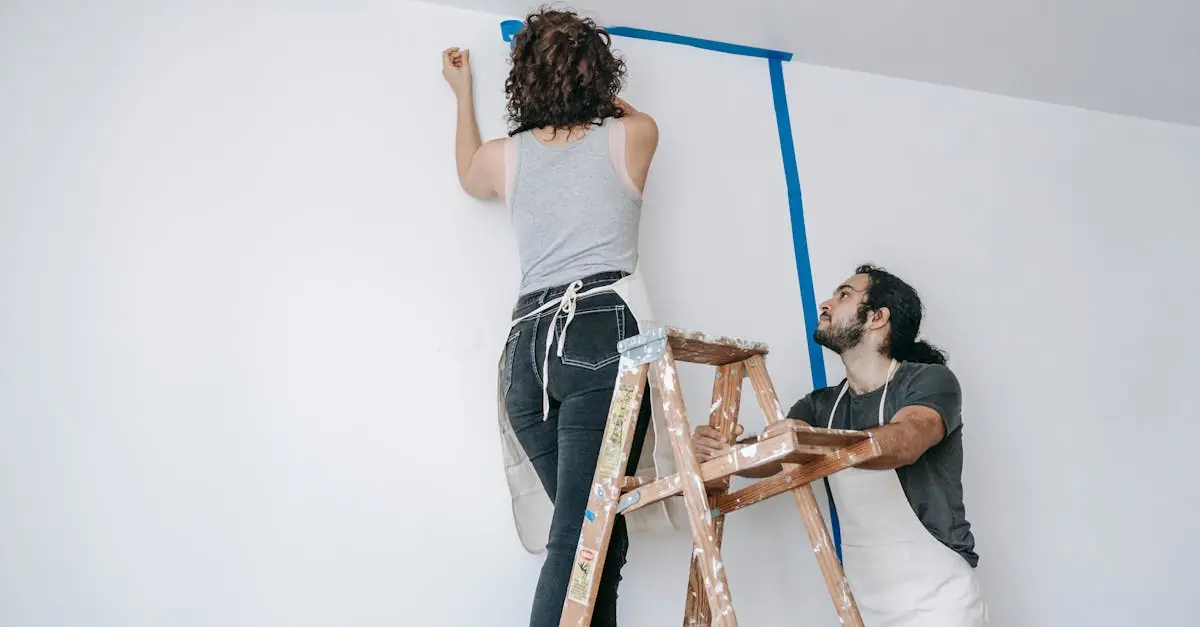In the world of house hacking, upgrading rentals can feel like trying to teach a cat to fetch—challenging but oh so rewarding. With the right tweaks, a drab rental can transform into a cozy haven that attracts quality tenants faster than you can say “passive income.” It’s not just about slapping on a fresh coat of paint; it’s about making smart, strategic upgrades that boost rental value and tenant satisfaction.
Imagine turning that outdated kitchen into a culinary paradise or sprucing up the bathroom to rival a spa retreat. These upgrades don’t just make a space look good—they create an inviting atmosphere that tenants can’t resist. So, get ready to roll up those sleeves and dive into the art of upgrading rentals. After all, a little investment now can lead to big returns later—and who doesn’t want to be the landlord everyone raves about?
Table of Contents
ToggleUnderstanding House Hacking
House hacking involves using a primary residence to generate income. This approach allows homeowners to offset living expenses through rental income. Several strategies exist within house hacking, including renting out rooms or converting spaces into separate rental units.
Effective upgrades play a crucial role in this strategy. Investing in property improvements attracts quality tenants and increases rental value. Kitchens and bathrooms often yield the highest return on investment. Enhancements like modern fixtures, fresh paint, and energy-efficient appliances create inviting spaces.
Landlords should also consider outdoor areas. Attractive landscaping and functional outdoor spaces can enhance curb appeal. Additionally, features like patios or gardens may appeal to potential renters.
Implementing consistent upgrades brings long-term benefits. Maintaining the property’s condition fosters tenant satisfaction and loyalty. Landlords with upgraded properties often experience lower vacancy rates.
Successful house hackers remain proactive in their approach. Regularly assessing property condition and making strategic improvements sets them apart. Staying informed about market trends helps landlords understand tenant preferences.
Overall, house hacking not only reduces housing costs but also creates opportunities for financial gain. Whether a landlord chooses to remodel existing spaces or develop new rental units, thoughtful upgrades can lead to significant returns and a positive reputation within the rental market.
Benefits of Upgrading Rentals
Upgrading rentals provides various advantages, from increasing property value to enhancing tenant appeal. Thoughtful enhancements create a more desirable living space, addressing both immediate and long-term needs.
Increased Property Value
Upgraded properties experience significant value appreciation. Addressing essential areas, such as kitchens and bathrooms, yields the highest return on investment. Investing in modern appliances improves functionality and aesthetics. According to the National Association of Realtors, a kitchen remodel can recover about 60% to 80% upon sale. Properties featuring attractive outdoor spaces and well-maintained landscaping see increased market interest. Enhanced curb appeal often leads to quicker sales and higher asking prices. Property owners benefit from regular assessments and updates, ensuring their investments remain competitive.
Enhanced Tenant Appeal
Upgrades significantly boost tenant satisfaction and retention. Modern amenities, such as energy-efficient fixtures, attract environmentally conscious renters. Fresh paint and updated flooring create a welcoming ambiance that encourages longer leases. Properties showcasing thoughtful design elements often enjoy reduced vacancy rates. According to RentCafe, 68% of tenants prefer modern conveniences in rental properties. Focused enhancements promote a positive living experience, which leads to repeated renewals. Fostering tenant loyalty enhances overall profitability for landlords. By prioritizing tenant appeal, property owners can maximize rental income over time.
Key Areas to Upgrade
Upgrading key areas in rental properties significantly boosts tenant appeal and rental value. Focusing on strategic improvements enhances overall satisfaction and reduces vacancy rates.
Kitchen Improvements
Prioritizing kitchen enhancements leads to greater tenant interest. Upgrading appliances to modern, energy-efficient models attracts quality renters. Fresh paint and updated cabinetry create an inviting atmosphere. Incorporating open layouts maximizes usability and encourages social interaction. Countertops made from durable materials add style and function, increasing property appeal.
Bathroom Renovations
Targeting bathroom renovations results in immediate benefits for rentals. Replacing old fixtures enhances functionality and modernizes aesthetics. Installing tile flooring ensures durability and easy maintenance. Adding storage solutions can maximize space, which is helpful for tenants. New lighting options provide better illumination, creating a more welcoming environment.
Energy Efficiency Upgrades
Investing in energy efficiency improvements offers long-term savings for both landlords and tenants. Upgrading insulation reduces energy costs significantly, increasing property value over time. Installing energy-efficient windows improves climate control, appealing to environmentally conscious renters. Smart thermostats enhance convenience and lower utility bills. Incorporating LED lighting throughout the property further decreases energy consumption.
Strategies for Upgrading Rentals
Upgrading rentals requires careful planning and execution to maximize returns. Property owners can implement specific strategies to enhance tenant appeal and value.
Budgeting for Upgrades
Allocating funds for upgrades is crucial for successful renovations. Landlords should evaluate potential costs versus projected returns. Establishing a detailed budget helps prioritize necessary improvements such as kitchen and bathroom changes. It’s advisable to set aside 10% of the total property income annually for upgrades. Additional funding for unexpected expenses can prevent financial strain. Evaluating quotes from suppliers and contractors ensures efficient use of resources. By planning accordingly, property owners maintain control over expenses while executing impactful upgrades.
DIY vs. Hiring Professionals
Deciding between DIY projects and hiring professionals requires careful consideration of skills and job complexity. Simple tasks like painting or landscaping can often be effectively managed by landlords themselves. Conversely, extensive renovations, such as bathroom remodels or electrical upgrades, typically demand professional expertise. Analyzing the scope of work will guide this decision; complex projects can result in costly mistakes if tackled independently. Evaluating time constraints is also essential; busy landlords may benefit from hiring professionals to ensure timely completion. By weighing these factors, property owners enhance their rentals efficiently while saving time and avoiding unnecessary risks.
Upgrading rental properties is a strategic move that can yield significant benefits for landlords. By focusing on key areas like kitchens and bathrooms along with enhancing outdoor spaces, property owners can attract quality tenants and boost rental income. Thoughtful improvements not only enhance tenant satisfaction but also contribute to long-term property appreciation.
Regular assessments and staying updated on market trends ensure that upgrades remain relevant and appealing. With careful planning and budgeting, landlords can effectively manage costs while maximizing their investments. Ultimately, creating inviting and functional spaces leads to happier tenants and a thriving rental business.





